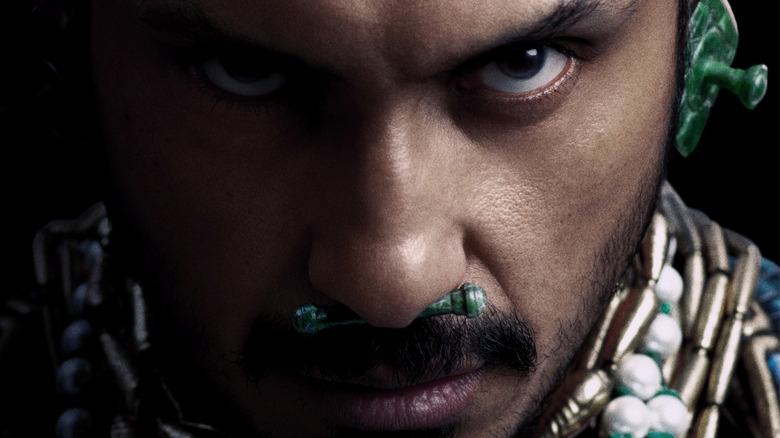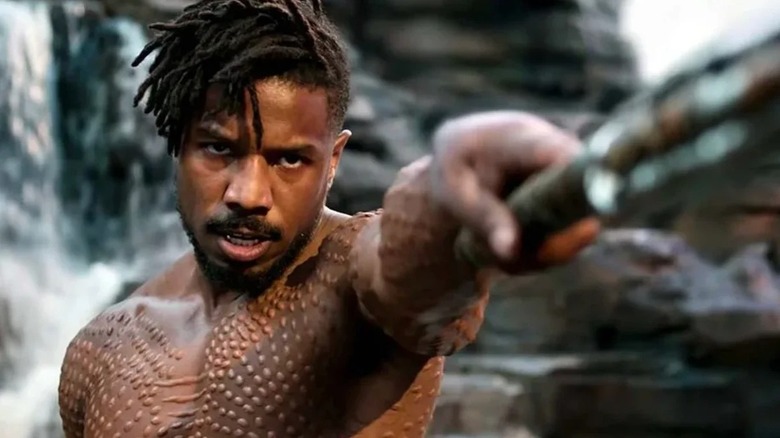Why The Black Panther Movies Don't Feature 'Villains,' According To Ryan Coogler
Ryan Coogler's "Black Panther" changed the game for the Marvel Cinematic Universe when it was released in 2018. Though Chadwick Boseman played a supporting role as T'Challa in "Captain America: Civil War," Coogler's solo film acts as a fully fledged reintroduction into the titular king and his afrofuturist society of Wakanda. Four years later, Coogler is back with "Black Panther: Wakanda Forever," a sequel that aims to expand the mythology of Wakanda while paying respects to Boseman, who sadly passed away in 2020.
Trying to balance spectacle and grief in equal measure within the confines of an MCU film can't be easy, but Coogler had already established the kingdom of Wakanda in "Black Panther" with maturity and complexity. Despite the flashy car chases and fantastical imagery, the core of the first film was a philosophical dispute between T'Challa and his family legacy versus the radical principles of antagonist Erik Killmonger (Michael B. Jordan).
"Wakanda Forever" introduces Namor (Tenoch Huerta Mejía), the powerful, immortal mutant ruler of Atlantis. Though we know he serves as this film's antagonist, the exact nature of his conflict with Wakanda is one of the film's best kept secrets. When praised for his ability to create compelling villains in an interview with Collider, Coogler actually disagreed with that characterization of Namor and Killmonger:
Coogler: "Actually, for me, I don't see them as villains. I think antagonist is probably..."
Collider: "Yeah, I said the wrong word."
Coogler: "No, I think that word's fine. I don't try to govern people's words, you know what I'm saying?"
It may seem like a simple change of phrasing, but the difference between "villain" and "antagonist" informs Coogler's approach to storytelling from an empathetic place. The word "villain" packs an inherent amount of judgment, while "antagonist" evokes a neutral observation of opposition.
Antagonists, not villains
In the original "Black Panther," Wakanda was a technologically advanced but isolationist country, sworn to protect its own instead of meddling in foreign affairs. Killmonger remains memorable to this day because his ideological foil to T'Challa was strong and raised a difficult question about the nature of power: does Wakanda have a moral responsibility to protect those of African descent around the world from their oppressors? Though Erik was corrupted with revenge and hatred, it's hard to label his motivations as purely villainous. Coogler elaborated:
"That's kind of like how I think about them. I think about them as, you know, this is a character that's going to come in conflict with my protagonist. It'd be interesting if they want the same things, but because of who they are, and what shaped them, they want to get those things in different ways and their means come in conflict with each other. It comes to a head. That's kind of like how movies I like are structured."
Indeed, as dual heirs of the Wakanda throne, one of the only things that separated T'Challa and Killmonger down different paths was unfortunate circumstances. T'Challa might have defeated Killmonger in the first chapter of "Black Panther," but Killmonger's philosophy and suffering is something that never leaves him. In an MCU mostly defined by hard lines of good vs. evil, this is what made "Black Panther" a more sophisticated film.
Coogler went on to describe the central tension in "Wakanda Forever" as being inspired by one of his favorite films, James Cameron's "Terminator 2: Judgement Day," where the T-1000's and T-800's battle over John Connor becomes the center of a huge moral dilemma. We're excited to find out how that translates to Namor's storyline, as "Black Panther: Wakanda Forever" opens this weekend.

